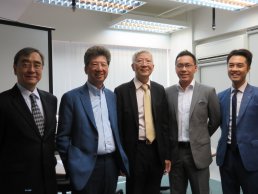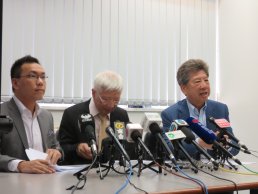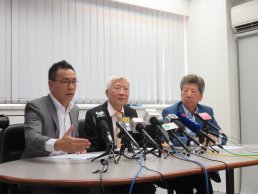10 July 2017 | Path of Democracy
Path of Democracy’s One Country Two Systems Index (1C2S Index) stands at 6.52
Citing strong recognition of dual identities as ‘Hong Kongers’ and ‘Chinese’ among public
Path of Democracy has developed the One Country Two Systems Index (1C2S Index), the first index of its kind since the return of Hong Kong to Mainland China two decades ago, to provide an objective assessment of the implementation of “One Country Two Systems” (1C2S) in Hong Kong. The first reading of the 1C2S Index, compiled using a public survey and international indices, comes in at 6.52. Public survey results suggest that respondents feel strongly about their dual identities as “Hong Konger” and “Chinese”, and that they are sharply polarised on Article 23 legislation.
This pilot study marks the first edition of Path of Democracy’s 1C2S Index. Subsequent editions of the index will be released every 6 months to reflect the latest development of 1C2S in Hong Kong. Further refinements to data collection and index construction methodology will be implemented on a regular basis.
The 1C2S Index is composed of two metrics. The first metric, 1C2S Public Survey Index, is derived from a telephone survey commissioned by Path of Democracy, and conducted by the Hong Kong Institute of Asia-Pacific Studies of the Chinese University of Hong Kong during 23 May and 3 June 2017. The telephone survey interviewed a random sample of 1,002 Cantonese or Mandarin speakers aged 18 and above (survey response rate: 36.8%) who were asked to appraise various areas of 1C2S implementation in Hong Kong. In the current round of study, the 1C2S Public Survey Index comes in at 4.84 (out of a maximum score of 10).
The second metric, Freedom and Democracy Index, is based on the assessment of international think-tanks of Hong Kong’s freedom, democracy and human rights conditions. Freedom and Democracy Index is calculated as an unweighted average of 3 international indices, namely Economic Freedom Index, Personal Freedom Index, and Democracy Index, and comes in at 8.19 (out of a total of 10) in the current round of study.
According to the coordinator of the study and Governor of Path of Democracy, Professor SUNG Yun Wing, 55.9% of the sample and 55.0% pan-democrat participants in the telephone survey strongly consider themselves as both ‘Hong Konger’ and ‘Chinese’. In addition, the identity scores are positively correlated – the more strongly one sees himself/herself as ‘Hong Konger’, the more strongly one sees himself/herself as ‘Chinese’ (and vice versa). This provides a conducive environment for the successful implementation of 1C2S.
On the other hand, when asked whether the current government should initiate a public consultation for Article 23 legislation, survey respondents are sharply divided. This can be seen in the similar proportions of respondents choosing both extremes of the rating scale, with 16.1% reporting a score of 1 (“Very unnecessary”) and 15.5% reporting a score of 7 (“Very necessary”).
Sung said the plausible reason for the polarization of views on the Article 23’s public consultation is that those who strongly oppose Article 23 legislation tend to reject public consultation as consultation is regarded as a prelude to legislation, whereas those who acknowledge it as an inevitable constitutional responsibility see the benefits of having a public consultation.
Furthermore, respondents with a pro-establishment stance feel more positive about a public consultation of Article 23 legislation than their moderate or independent counterparts, whereas pan-democrat and localist/self-determinist respondents tend to deem such public consultation “Very Unnecessary”. The survey also highlights a lack of consensus among moderate respondents towards public consultation on the said legislation. This lack of consensus among moderates and the Hong Kong public as a whole should be a cause of concern for policy makers.
Sung also pointed out that Hong Kong continues to rank very highly in international indices that track freedom, democracy and human rights conditions. For instance, Hong Kong achieved a score of 9.03 in the latest Economic Freedom Index by Cato Institute and Fraser Institute in 2014, placing Hong Kong the 1st in economic freedom globally. Meanwhile, Hong Kong scores 9.08 in the Personal Freedom Index (also by Cato Institute and Fraser Institute), a higher score than its developed peers across East Asia, including Japan, Taiwan, South Korea, and Singapore. These findings suggest that Hong Kong has been able to achieve a high level of human rights and personal freedom under 1C2S. In terms of the Democracy Index compiled by the Economist Intelligence Unit, Hong Kong’s democracy score stands at 6.42 – a lower score than Japan, Taiwan, and South Korea, but higher than Singapore.
According to Path of Democracy, the public survey highlights multiple areas of concern for implementation of 1C2S. Despite the fact that survey respondents generally acknowledge their dual identities as “Hong Konger” and “Chinese”, young adults as a group score particularly poorly in their recognition of the “Chinese” identity. In addition, the survey reveals that the public remains deeply divided towards whether the current government should initiate a public consultation for the Article 23 Legislation. These findings should warrant attention from policy makers.



